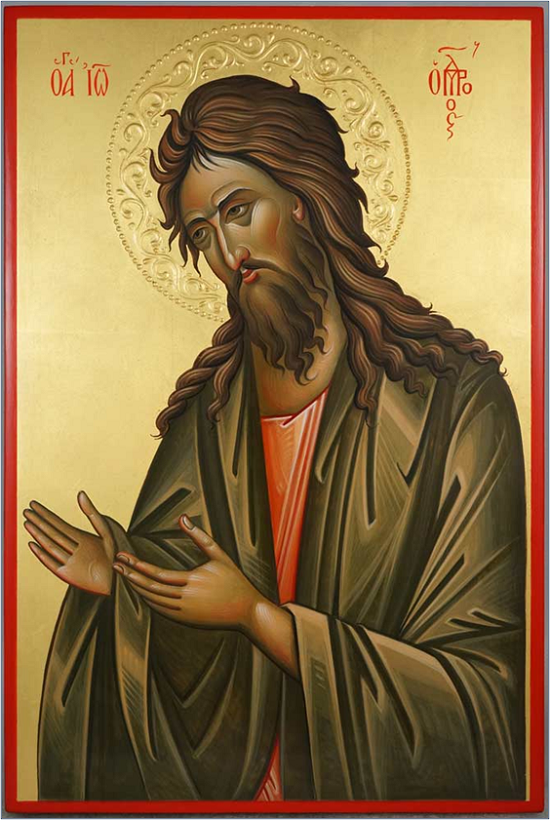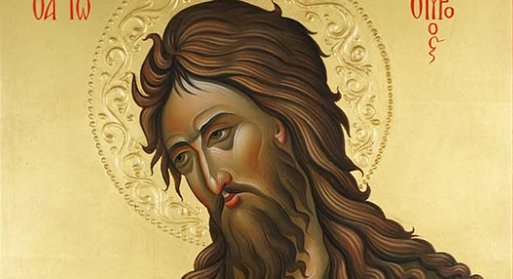Recapturing Expectation
Third Sunday of Advent Scripture Readings

We heard in today’s gospel the words, “Now the people were filled with expectation.” As I said in my last homily, the people of Israel at that time were chomping at the bit in expectation of the coming of the promised Messiah. The people had been waiting for centuries for the Messiah to manifest himself and bring them relief, but it was only at this time in their history that their expectations ran this high. It’s as if there had been a theme running through the history of Israel, but it was then that the theme reached its crescendo and became the main melody. The people instinctively knew that the Spirit and power of God were about to break through into human history. Yet, where is that intuition now?
You know, there is no “war on Christmas.” That’s a fiction dreamed up by Christian nationalists to safeguard the celebration of their favorite secular holiday. Even beyond that, our celebration of Christmas remains problematic, although probably not for the reasons you may think. The problem with Christmas as we’re accustomed to celebrating it is that it lacks the sense of expectation that we just heard about in the gospel. That expectation was born of a deep-seated spiritual need. Once upon a time, Christians identified with that need and found its fulfillment in the coming of the Christ. But slowly, over time, that spiritual need got replaced by a desire for self-fulfillment. The need born of the emptiness of a world without a spiritual foundation has been shifted to the want of more material possessions. The expectation of spiritual fulfillment in the Messiah has shifted to waiting for gifts from Santa Claus. “The stockings were hung by the chimney with care in hopes that Saint Nicholas soon would be there.”
Don’t get me wrong. There’s nothing at all wrong with celebrating the turning of the year. Nothing could be more natural, in our northern hemisphere, than to celebrate the coming of another seasonal cycle. As humans, we celebrate with food and drink, lights and music, laughter and dancing, decorating and giving gifts. It’s what we do and what we’ve done since humanity first arrived on the scene. Yet, all of this is a pale substitute for—and I’ll use a hackneyed phrase—the true meaning of Christmas.
We’ve all heard the good news that the Messiah has come a long time ago. Okay. We celebrate his coming. Good. Does that mean we’re all set? Does it mean that there’s nothing more to anticipate, nothing more to hope for, nothing more to expect? Is God in his heaven, and all’s right with the world? Hardly. Selfishness, self-centeredness, greed, and tyranny still run the show. Demagoguery is the order of the day. The great pandemic of our age isn’t COVID, it’s loneliness. Spiritual connections and sensitivity to the great mysteries of life have been secularized out of existence, and religions and churches have been among the worst offenders. In most cases, they’re indistinguishable from secular businesses.
God has never abandoned his creation. God has never turned a deaf ear to our cries for help. As our fourth Eucharistic Prayer says, “Again and again you offered a covenant to [us] and through the prophets taught [us] to hope for salvation.” That’s why the coming of the Messiah, the fulness of God’s self-revelation to us, was not a one-and-done event. Yes, in the fullness of time, that revelation broke through into human history in the person of Jesus. But that couldn’t have been the end of it. The need for a Messiah continues. Revelation is ongoing through the gift of God’s own Holy Spirit to us. It’s that Spirit that empowers us to be the continuation of God’s revelation in the world and thus to continue the work of the Messiah. If we take it seriously, that’s a frightening thought. It should be when we realize that it’s we who’ve been empowered to bring the spiritual healing it longs for to our world.
John the Baptist told the people, “I am baptizing you with water, but one mightier than I is coming. … He will baptize you with the Holy Spirit and fire.” It’s we who have received that baptism. It’s we who’ve been empowered by the life Spirit of God himself. It’s we who are the fire that confronts and consumes the emptiness, futility, and loneliness of our world with God’s love shining in and through us. It’s we who bear silent witness against the meaninglessness of a purely secular existence.
If we’re the extension of the Messiah’s coming through space and time, then what meaning does Advent have? Advent is our opportunity to focus on the spiritual needs of our world. It’s our chance to renew our awareness that, as in the time of John the Baptist, so now, the world looks with longing for healing and deliverance from its insanity. It doesn’t recognize how the hearts of its people are filled with anxiety, longing and hoping for a Messiah. It doesn’t know that we are that Messiah whenever we answer that anxiety with the quiet reassurance of the presence and saving power of our God.
We pray that our own awareness and understanding of the world’s needs may be deepened this Advent and that we may understand that when the Prophet Isaiah wrote, “The Spirit of the Lord is upon me, because he has anointed me to bring glad tidings to the poor,” he was writing not only about Jesus of Nazareth, but he was also writing about us.
Get articles from H. Les Brown delivered to your email inbox
